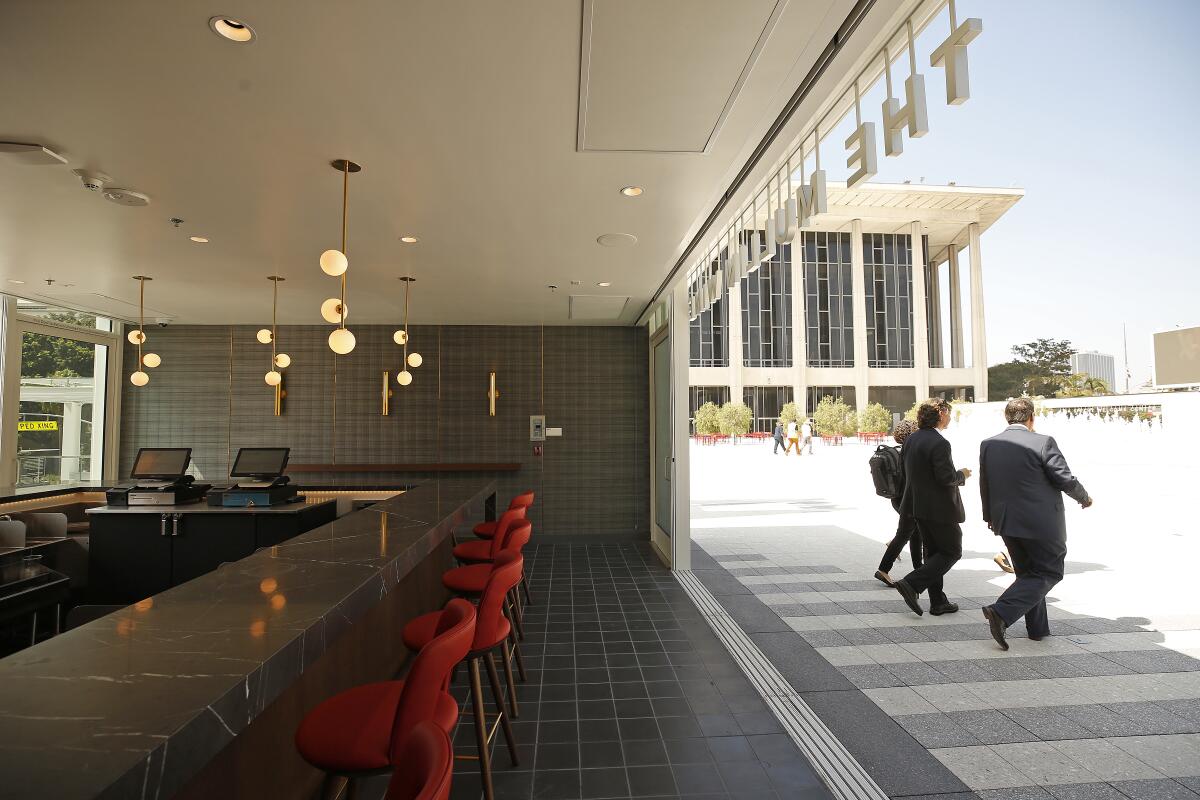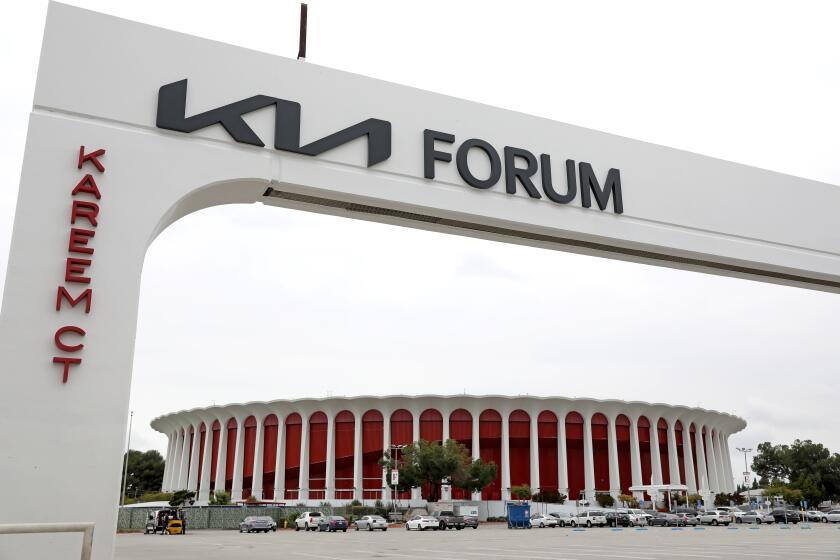When bathrooms have naming rights, has branding gone too far?

- Share via
It took me a few moments standing there outside the bathrooms at the Music Center in downtown Los Angeles before I fully grasped that some fundraising genius had actually sold the lavatory naming rights.
It seemed inconceivable, but there it was in big letters over the entrance: “Lefton Family Restrooms.”
On the one hand, good for the Lefton family for stepping forward to help the Music Center pay to renovate its plaza. Cities need people who support the arts, including the less glamorous, more functional parts of the underlying infrastructure.
But branded bathrooms? Really?
Opinion Columnist
Nicholas Goldberg
Nicholas Goldberg served 11 years as editor of the editorial page and is a former editor of the Op-Ed page and Sunday Opinion section.
Naming rights had already been on my mind that day because I had, for the first time, passed the Crypto.com Arena, the structure formerly known as Staples Center. In November, Crypto.com purchased the arena’s naming rights for 20 years for $700 million.
That, in turn, had reminded me of the SoFi Stadium in Inglewood, named (in return for $30 million a year) for SoFi Technologies Inc., as well as the deal struck last year to name the still-under-construction Intuit Dome. Earlier this month, it was announced that the Forum, the 55-year-old former home of the Lakers, would become the KIA Forum, after the South Korean car manufacturer.
Of course, putting a philanthropic donor’s name on the Music Center’s bathrooms is not the same as selling off two decades of stadium naming rights to the highest corporate bidder in a profit-generating business transaction.
But the concept is loosely the same. Give some money and get your name slapped up for all to see. In addition to the bathrooms, the Music Center in its 2019 renovation offered donors naming rights to the plaza’s bar, its restaurant and a new “welcome center.”
Did you skip it? The United Nations’ climate change panel just delivered more proof of our stubborn, catastrophic climate passivity.
Sometimes it feels like there won’t be anything left that doesn’t have the name of a big-bucks donor or corporate conglomerate on it. Sometimes it seems that the buildings, streets and institutions of L.A. and other American cities are just giant marketing opportunities and potential revenue generators.
People are becoming inured to the unintentional comedy of such cringeworthy names as Minute Maid Park or Guaranteed Rate Field. Names like FedEx Field roll off the tongue. How long before we sell the name of the teams themselves? Houston Astroburgers, anyone?
And the naming craze goes beyond just stadiums (and bathrooms). In 2010, the Southeastern Pennsylvania Transportation Authority changed the name of Philadelphia’s Pattinson Avenue subway station to AT&T Station. It’s now been renamed again for NRG Energy, for another $5 million.
Think it can’t happen here? In 2016, Los Angeles Metro agreed to allow the sale of naming rights for light-rail lines, bus stops, subway stations and parking garages. Two months later, thankfully, it repealed the controversial plan, citing legal concerns.
The Inglewood arena, home to the Lakers before their 1999 move to Staples Center, will get a new name, Kia Forum, following a deal with the Seoul-based automaker.
According to Wired, Christie’s auctioned off the right to name a new species of shark in 2007. The proceeds went to environmental causes. Does that make it OK?
What will be next? Can I sell the naming rights of my child?
Oops. Someone’s already thought of that.
In 2015, Lavonne Drummond, an unemployed Arkansas woman, solicited bids on eBay for the right to name her unborn son, hoping to raise funds to repair her Dodge Caravan and to buy school supplies for her other children. The winning bid came in at $6,800, but the bidder eventually declined to pay, and presumably she named the child herself.
It’s reminiscent of David Foster Wallace’s 1996 novel, “Infinite Jest,” set in a future when years are no longer denoted by sequential numbers but are sold off in return for subsidies. Much of the action takes place in the “Year of the Depend Adult Undergarment.” When he wrote it, it seemed clever — not prophetic.
Companies are willing to pay millions for naming rights because, as one consulting firm puts it, they “drive brand value and generate maximum ROI [return on investment]” through repeated free mentions of the business or product, familiarization with the company’s logo and the introduction of the brand’s name into ordinary everyday conversation. Nonprofit museums, universities and performing arts centers offer them to sweeten the ask for big ticket projects.
The Staples Center will become known as Crypto.com Arena as part of a new 20-year deal between the Singapore cryptocurrency exchange and AEG, owner of the home arena of the Los Angeles Lakers, Clippers, Kings and Sparks.
What became of naming places and institutions after society’s heroes and historical figures, such as university presidents, accomplished scientists, civil rights leaders, politicians and sports stars? (And naming transit stations after the street where they’re located?)
It’s true that we’re now in the process of un-naming streets and institutions for heroes we no longer consider heroic. But that happens with naming rights as well. Remember when the Houston Astros had to pay $2 million to buy back their ball-field naming rights from the scandal-tainted Enron Corp.? And when Walmart heiress Paige Laurie’s name was scratched from the stadium her parents had donated at the University of Missouri after she was accused of cheating her way through USC?
And don’t get me started on the now-disgraced Sackler family, makers of Oxycontin. In December, the Metropolitan Museum of Art took the Sackler name off the “Sackler Wing” of the museum and six other exhibition spaces. The Louvre did the same in 2019.
Of course it would be disingenuous not to acknowledge that we’ve always named some libraries, museums and universities — and even some new biological species — after donors and patrons. The Music Center has long carried the names of wealthy families that built it, including the Ahmansons, Tapers and Chandlers. Boston’s hallowed Fenway Park, for that matter, was named for a local realty company.
So this naming business is not exactly new. It’s just out of control.
I’m glad there are bathrooms at the Music Center plaza — permanent ones not housed in trailers, finally. I don’t mean to compare a philanthropic family to a profit-driven behemoth like Enron or Crypto.com.
The Music Center will unveil its newly renovated plaza on Wednesday and announce a gift, from philanthropist Cindy Miscikowski, of $12 million in seed money for the TMC Arts Fund.
But the naming trend is tiresome.
In a bizarre twist on it, 13 alumni donors from the University of Wisconsin business school agreed in 2008 to donate a total of $85 million in exchange for a promise that the school would not sell its name for at least 20 years.
There’s an idea I could get behind. No-naming rights.
Because not everything needs to be branded.
More to Read
A cure for the common opinion
Get thought-provoking perspectives with our weekly newsletter.
You may occasionally receive promotional content from the Los Angeles Times.













